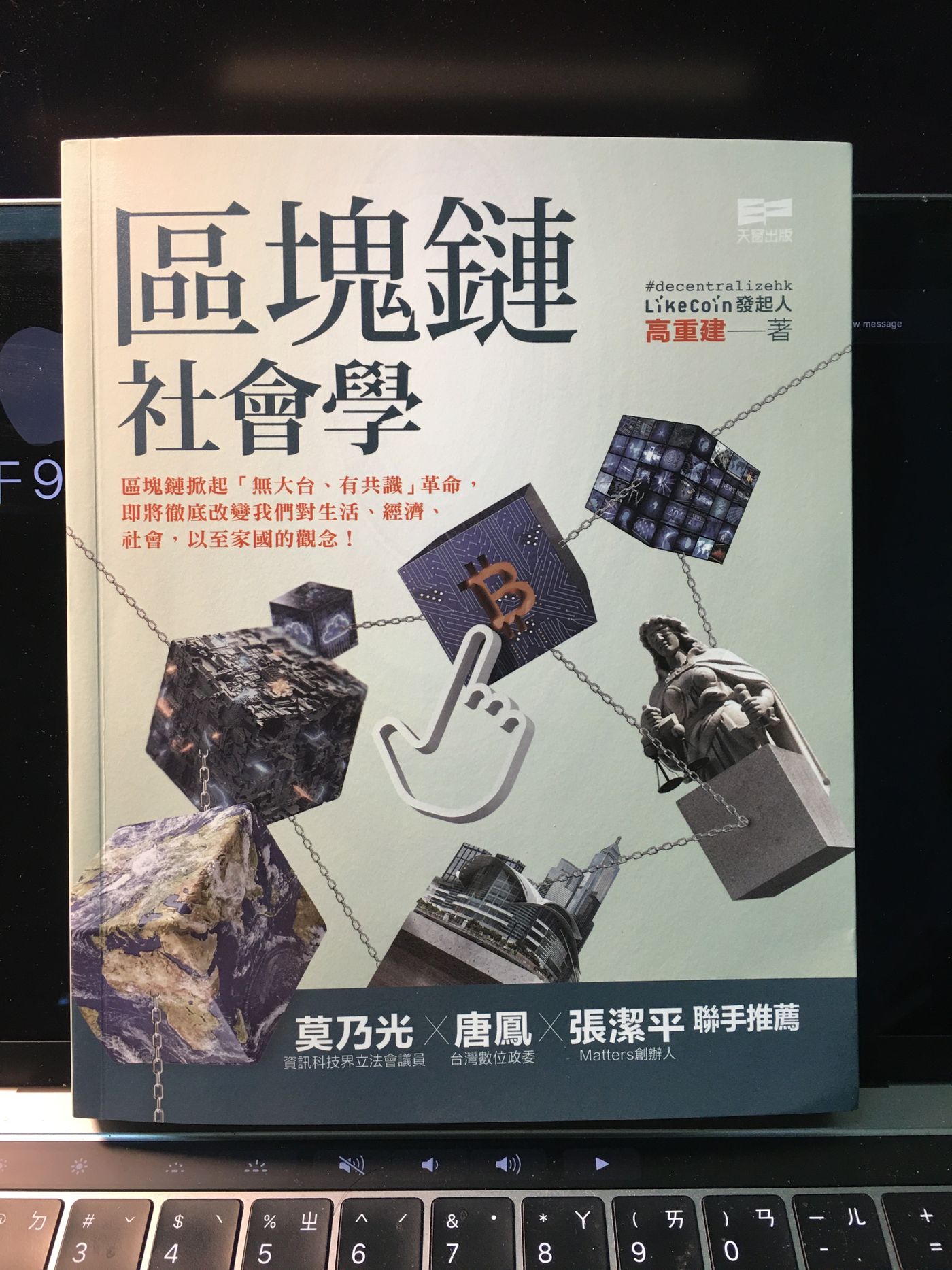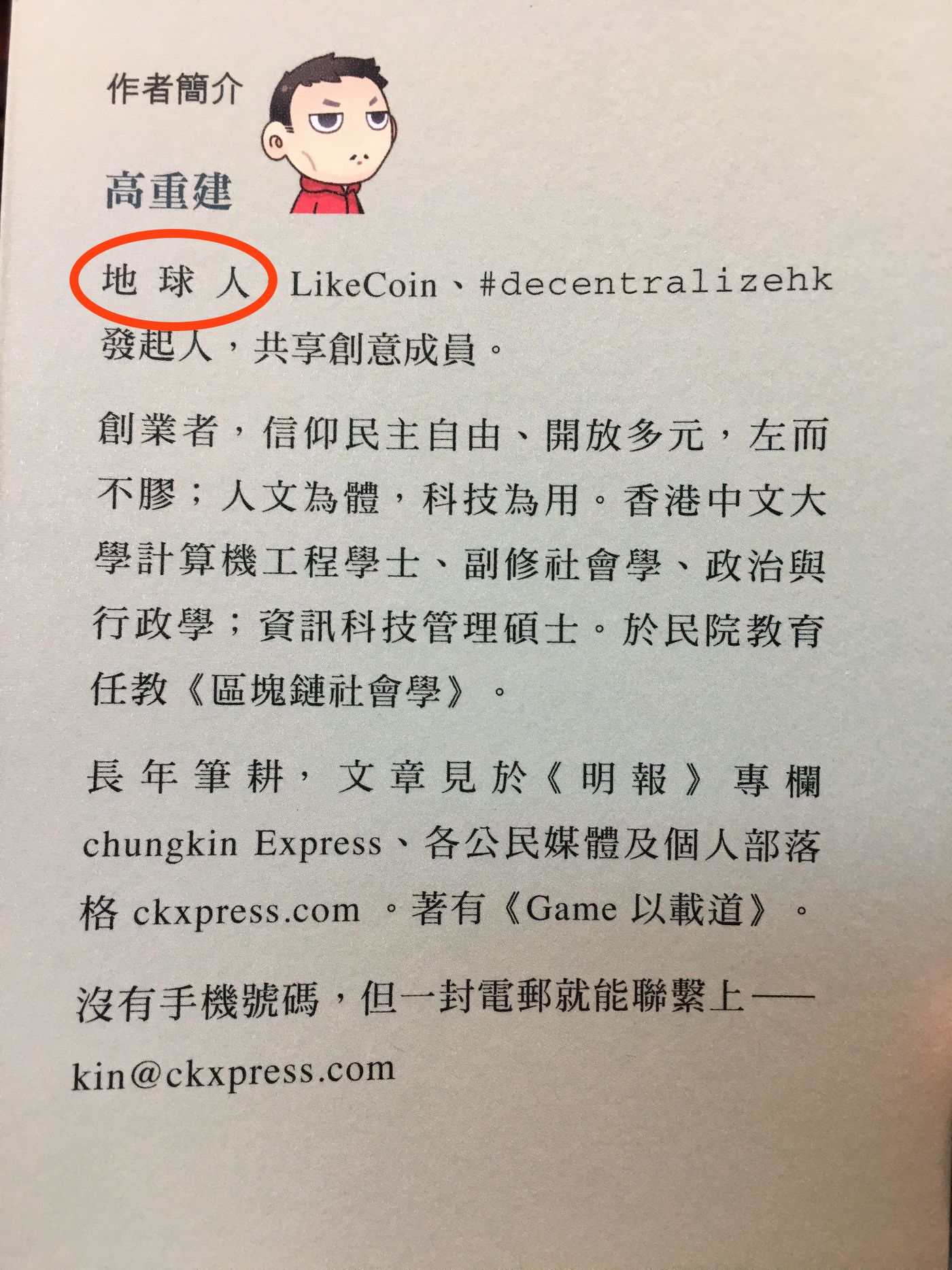Code Farmer Daily - "Experience" Blockchain Sociology - Reading Experience (Part 1)

foreword
I started to write the first blog in my life in 2018. In 2019, I officially started serializing Android technical articles. In 2020, I began to contact Likecoin. Finally, in 2021, I officially began to face Likecoin.
Blockchain is an emerging industry in this era. Many colleges and universities use the name of " cultivating emerging blockchain talents " to recruit students when recruiting, but everyone who has been stationed in Matt City for so long, how many of us really to understand the blockchain?
And ask, seriously, what is blockchain , why is this book called blockchain sociology instead of blockchain code ? Consensus ' revolution?
Yes, your question is my question. Before I got this book, I also asked myself, what is this book talking about? Why does Matters exist? Why does a good back-end system not need to use IPFS technology? ?
The last core question
What exactly does Likecoin stand for?
In this series of articles, I will not make any jokes or talk about any nonsense; in order to support the author of Likecoin, I do not choose to pay with 5500Like (just 5500, I have doubled what I earned in Matters), I choose to pay my of NT go to the blog to buy. For me, knowing Likecoin and Matters is definitely very serious (although the author himself will probably complain about me...), but I would rather hollow myself out in order to convey the concepts and knowledge I have absorbed to Matters All of you know, let yourself know how this unprecedented Matters really realizes the concept of creative value?
I also sincerely hope that since everyone is a part of Matters, after reading my experience, you can also support our general manager Gao @高建建 and collect a copy . This book is not terrible, there is no code in it, please feel free to use it
book catalog
Chapter 1: A Dictionary of Misunderstandings 1.1 Learning 1.2 Value 1.3 Money 1.4 Country 1.5 Virtual Chapter 2: Blockchain and Trust 2.1 The Immutable Digital Lennon Wall 2.2 Consensus without a Big Platform 2.3 Digital Mask: Anonymity and Encryption 2.4 Building Trust Machines 2.5 Architects and Prophets Chapter 3: Blockchain and Value 3.1 The Drift Classroom: One Coin, One World 3.2 Money is an Adjective 3.3 Guarding Core Values 3.4 Solving the Tragedy of the Commons 3.5 Democratizing Coinage Chapter 4: Blockchain and Media 4.1 Creation is Valuable 4.2 Post-Truth Era 4.3 Stratosphere 4.4 LikeCoin: Changing the Creation Ecosystem 4.5 Matters: Creating a Public Discussion Space Chapter 5: Blockchain and Governance 5.1 Blockchain Republic 5.2 Appreciating the Citizen Republic 5.3 #decentralizehk 5.4 Republic Blockchain 5.5 Summary: From Zero Sum to Republic
I will share the blockchain sociology in multiple episodes, but don’t worry, it’s only the first, middle, and second episodes at most, and it’s not much more; in this episode, the progress I will share is from chapter 1 to chapter 2 Sections of Chapter - Dictionary of Misunderstandings, Blockchain and Trust
Do review after learning? Learning over time?
At the beginning of the book, the author hopes that you will fundamentally re-understand a new knowledge. It is not difficult to say that blockchain is difficult, and it is not easy to say that it is very simple; A more learned person will not understand something , the reason why we do not explore here, but if we explore the reason, in a word, " this thing is too new, old knowledge will hinder your understanding. "
Study and study, Chinese is broad and profound; should you study first and then study? Or should you study first?
Now our social "books" are often not the first-hand information. As an engineer, I understand that whenever a new technology is launched, the information is usually in English at the first time. It's already second-hand, then Traditional Chinese is third-hand... Finally, when you see this information written in a book, I'm afraid I'm already educating others to use this technology.
Learning after learning, learning after learning, sounds extremely abstract, but as an engineer I thoroughly feel its importance
price and value
What is the difference between price and value? I thought about it for a long time when I read this. In fact, this is a very simple truth. How much is the price of a house in Daan District, Taipei City? OK, just grab it, 20 million Taiwan dollars; then, what is the value of the house?
The answer is to live
The price will change, the price will be affected by the market, and the price will be fired, but the value will not change much; in this society, various industries and professions are extremely needed, but if we When "price" is in command, and success is equated with price, what will our society be like?
Money, States and Virtual Platforms
What is money? How did he come about? According to the definition of finance, the size of money (relative exchange rate) reflects the amount of gold held by the state gold , which is a symbol of national strength in disguise
But in essence, the appearance of money means that there is a strong and valuable thing behind it, and the size of our coin depends on how many people are willing to pay for the value of the thing behind it - and the regime , is also a kind of value existence; the existence of currency (fiat currency) represents the recognition of this regime, and also means that this currency is backed by this regime
But if there is a regime, in common sense, should there be a country? In traditional thinking, there is only a country if there is a country. Building a nation... feels like it's built into you and me
But in fact, this earth - you and I all know an essence. When the earth was formed, except for islands, the formation of the earth had no borders. "The breakaway was at the Neolithic Age"
Do you know why Mr. Gao's introduction? The answer is

So, leaving aside the historical controversies and side issues, how did the nation come to be defined in the end? How to create a country? In fact, the United Nations "maybe" has the answer, but what really makes us do not need national borders, land, but closely connects us is the appreciation of the civil republic
Appreciate the civil republic, where you all live; for us, knowing your neighbors may be accidental or inevitable. Since the popularization of the Internet in 1993, gradually our friendship does not only exist in real life, we have another life circle - Internet
After the popularity of the Internet, problems gradually follow; online dating is considered to be the most risky behavior to be deceived, so most people will think about their behavior in the direction of the Internet, but we are often too Focus on those bad things, always ignore the positive benefits - for example, the rate of couples who met on the Internet and achieved positive results has increased from 2% in 1995 to 39%, which is the highest among all knowledge media.
Technology has brought about changes, and maybe not everyone can follow in his footsteps. But as the society is becoming more and more open, we must learn not to associate new technologies with falsehood, and then not understand it ; there are many examples in the book to support this sentence, I hope you can have a chance to read it .
trust
There is an example in the book that I find very interesting
I don't know if you have ever bought music in the Apple store? So have you ever thought that this song has been manipulated or that it is a plagiarized work?
Huh? Seems like some kind of switch has been flipped? Yeah, no one ever thought that Apple store music might be pirated and labelled genuine for sale?
Why have we never suspected this?
The answer is because we trust Apple and its related industries, right?
So why do we trust blockchain? Is there any trustworthy point in it? Yes, the book mentions why he can be trusted. Among them, " immutability ", " indestructibility ", " non-verification ", and " anti-counterfeiting " are the reasons why he is trustworthy.
I'm sorry here and there are new terms, but because of my space, I can't explain them here. Maybe I will give another explanation later?
No platform, there is consensus
This is the most, most, and core sentence in this book! You can understand nothing about other terms, but if you can understand this sentence, I hope everyone has the fate to understand it!
In fact, the original meaning of the word is " decentralization " that we often hear. The word Wudatai is a Hong Kong translation.
The meaning of no big platform means "there is no central pillar, no idea" ; in an organization with 1,000 people, if the organization has a power center that obeys the orders of the whole organization, it will make no difference even if the organization increases to 10,000 people. " There is a big platform "
Conversely, if a jury has only a few members, but as long as the process is completely and truly random, then the group is quite decentralized.
Consensus means that a group of people who have free will and are scattered in different places but have a common idea gather together to form the first huge force, which is called consensus .
The term "wutaitai" originated from the civil protests in Hong Kong. Even if this protest action has no headquarters and blossoms everywhere, the demands of the protest movement still reach consensus.
summary
I feel that the first half is all about breaking ideas and building new ideas . Of course, the content of each subsection is certainly not as poor as the bird's eye view I wrote. In the book, the author cites many examples to prove these concepts. Due to the space, I can only share what I think is the most essential part. I hope you don't feel too concerned.
Among them, I feel that the three subsections of value , no big platform , and money and country are my favorite and the most wanted to share with you. Among them, there is a consensus on no big platform that makes me feel the most amazing. Because this kind of thinking is easy to talk about, but in fact everyone's thinking is still unconsciously influenced by a "big platform", especially the political opposition is the most serious
So, this is the end of the first part of the experience, and I will share the content of the next part in a while, please look forward to it!
The copyright statement of this article is CC0 (public domain contribution declaration). This article can be shared without attribution, and can also be used for commercial purposes and modifications. For details, please refer to https://zh.wikipedia.org/wiki/%E7%9F %A5%E8%AF%86%E5%85%B1%E4%BA%AB%E8%AE%B8%E5%8F%AF%E5%8D%8F%E8%AE%AE
and <Blockchain Sociology> page.128 Figure 4-1 6 core licensing terms for sharing ideas
Like my work? Don't forget to support and clap, let me know that you are with me on the road of creation. Keep this enthusiasm together!














































- Author
- More